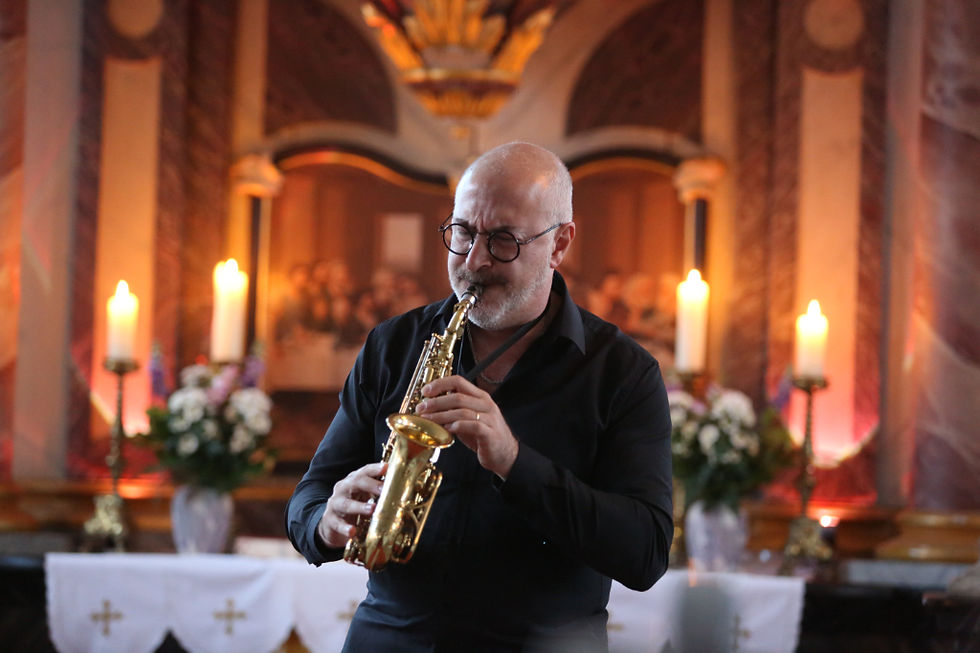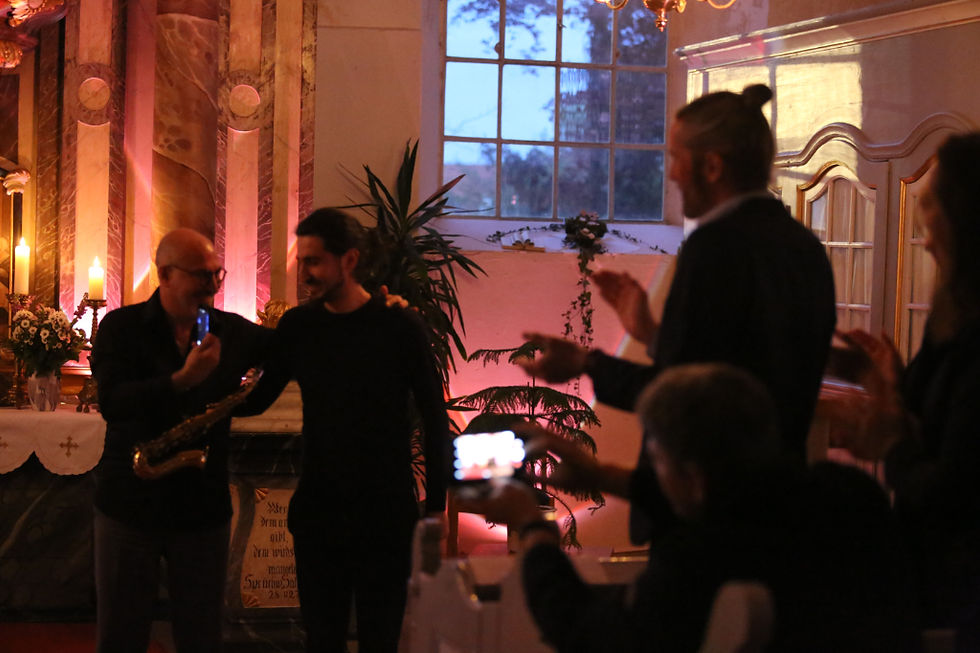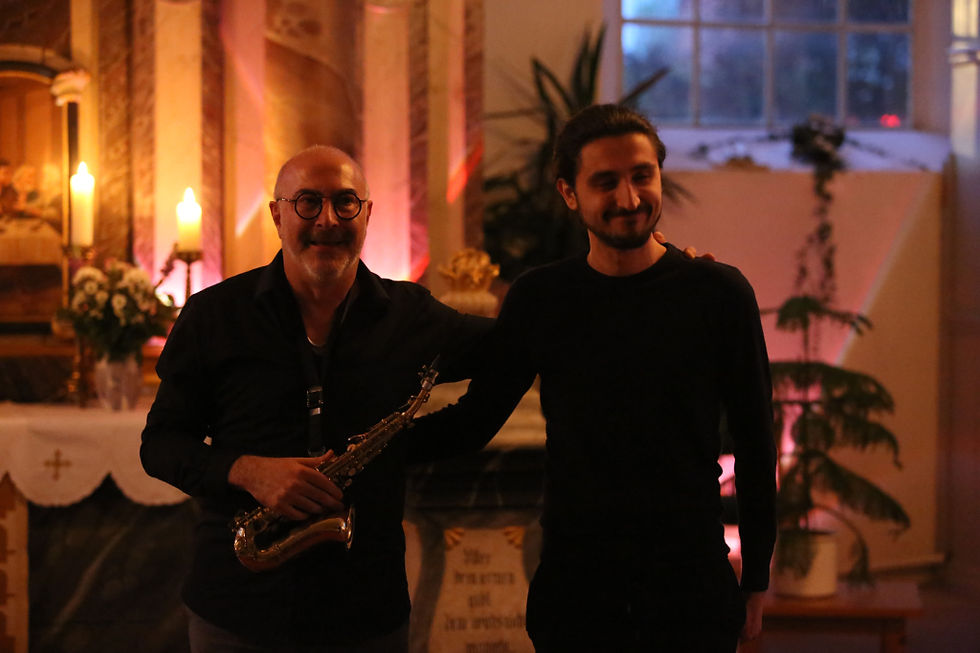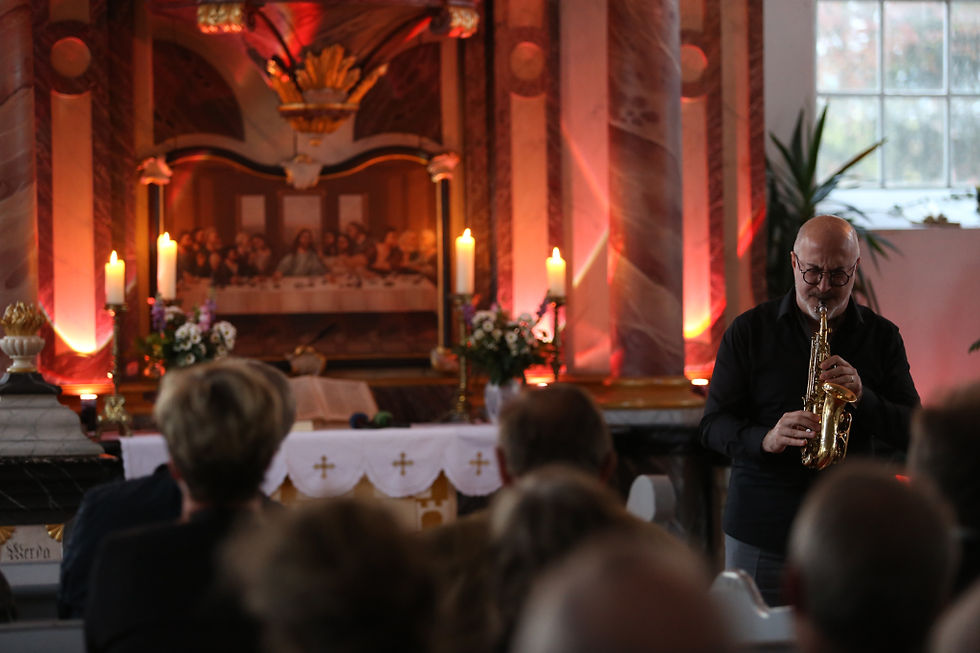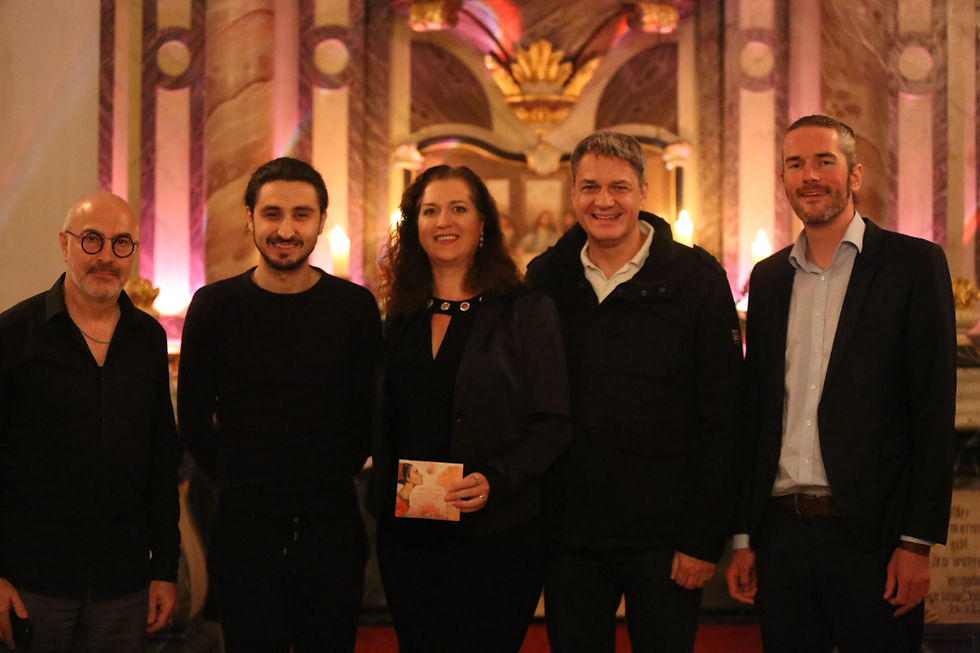CYCLE
RAIN SULTANOV
SOPRANO SAXOPHONE
ISFAR SARABSKI
ORGAN, PIANO
The Cycle
Very often while listening to music we think about something personal. We recall images from our past or present, sometimes illusions and dreams take shape of short moving pictures. They can be vivid or not, black and white or have vague shape. When listening to music we reflect, contemplate and travel in time and space.
Often we ask ourselves eternal questions of existence, birth and death. These questions and perhaps, answers as the basis that fully explains Mind and Soul, emerged in Rain Sultanov's project "the Cycle". This is not a philosophical essay, it is rather a mental representation of global and supra-conscious vision of music as human history, as evolution of the Spirit. It is believed that human life includes seven cycles - from Embryo to Oblivion. However, "the Cycle" describes the full circle till rebirth of our soul and body - "Reincarnation". Nine phases are nine cycles of life, oblivion and rebirth, they are the time to realize the existence, love,
cognition of the world and self.
"The Cycle" is not just a music project. This is creative tandem of two musicians – Rain Sultanov and Isfar Sarabski - who combined their compositions, thus, making a single energy space. Three instruments which have not been used before in combination are magically merged in one theme. Organ, saxophone and piano. They are a perfect combination and harmony in space. Each instrument brings its own philosophy in. Organ - divinity, saxophone - emotions, piano - evolution.
Organ as the basis of life, given from above, reminds about faith. It acts as the peacemaker, wizard, which the listener recalls with a pounding heart. It explains the reasons and calms down bursting expression of the saxophone. The saxophone, like the life itself, raises questions. Saxophone demonstrates phases, cycles, creating subtle improvisations on the theme of existence. Piano supports the saxophone. It is like a friend or companion that is always around, helps to understand and sometimes also questions. Through evolving dialogue between the piano and organ, Isfar Sarabski sort of moderates a conversation that the universe conducts with itself. Both voices create harmony, repeat and support each other discovering the undeniable truth. Merging with saxophone, they get overwhelming strength, stunning and powerful cosmic stream. Unison of these three instruments is, probably, the best discovery made by Rain Sultanov.
"The Cycle" represents consequential phases of human genesis and evolution and explores various options of its development. Rain Sultanov describes emerging of spiritual society and rise of humankind to a higher level not as an utopia but reality that strives for self-expression. Life given to us as a form of perception has become "the Cycle" reborn in more sophisticated way.
- LEYLA EFENDIYEVA -
Jazz Dünyası Magazine
LEYLA EFENDIYEVA: Besides your dynamic musical activity abroad you have projects in Baku, too. Here people always wait for you and love you very much. It's such nonsense for a jazz musician to be popular. Not to be listened to, understood, but really popular. In the nearest future you will have a concert within Baku Jazz Festival. Tell us about this.
ISFAR SARABSKI: Yes, it is a different and interesting project. This time Rain Sultanov set a task for me. It is great when a task is set. You fully get involved. You should be self-confident. It doesn't mean you should demonstrate your self-confidence to others. I think it's not correct. You should be self-assured in order to demonstrate to yourself. At this moment you begin to do things which are hard to you but which you would like to do. The experience I had with the organ was very interesting. As to the project we will present with Rain Sultanov within Baku Jazz Festival: I never played the organ.
But it was interesting for me, I roughly understood what this music is like and it impressed me.
Rain showed a piece of the recording to me which they performed with Elchin for the first time.
I liked it very much; it was very interesting to me. We called each other, I said I only need time to tune the instrument, because this music has completely different specific features. Rain agreed. A day before recording the album he said to me to come tomorrow to perform. To perform and to record. I paid no attention to the word "record". I thought we would write something with the piano or something else. Here I come, we practice things, and it happens that I see our sound engineer already arranging the equipment and I understood that he was preparing to make a recording. While I thought I would practice for a few days.
It turned out that this is what was great.
You know, I was not ready, but I organized myself because such a spontaneous recording is interesting in its way. There is a moment in music when you perform the same music for a long time, it can subside in terms of emotions sometimes. I mean you cannot already perform this piece so emotionally. You either need some break, or you need to perform something different. But here in this project we just started to feel the composition, to immerge into it as we already record it. Surely it becomes natural and so real. I am glad that we recorded it quickly and spontaneously. I am also very glad that Rain invited me to this project. It's a very interesting duet. When I listen to him I understand that we did it on a very good level. Such a cool sound. I am always ready for interesting projects. In principle, Dhafer's music is also spatial. You can think of it, you can assign your emotions the same way like in Rain Sultanov's music we recently did. This is what is the most important, I think …
LEYLA EFENDIYEVA: Thank you, Isfar! I will unveil a secret to you.
The tickets to your concert are almost sold out. We are looking forward to it!
- Jazz Dünyası magazine -
Jazzkonzert der anderen Art
Saxofonist Rain Sultanov und Pianist Isfar Sarabski im Dom
The church organ has been a bit player in jazz history, impacting about as much as an Alfred Hitchcock cameo blink and you'd miss it. Jan Garbarek and Kjell Johnsen's meditative duo album Aftenland (ECM, 2000) and a trio of gothic jazz recordings by Asaf Sirkis and the Inner Noise spring to mind, but after that you'd really have to dig. Cyclesees Azerbaijan's leading jazz musicians, soprano saxophonist Rain Sultanov embrace the solemnity of church organ in intimate dialogues that, without a doubt, owe a debt to Garbarek and Johnsen's
aforementioned collaboration.
Recorded in the Gothic Church of the Redeemer in Baku, shares some of the aching lyricism of Inspired By Nature (Ozella Music, 2017) though none of that record's free-jazz flights. Unlike Garbarek, who toggled between soprano, tenor and wooden flute on Aftenland, Sultanov sticks resolutely to the soprano throughout, with the result that the color variations on these nine tracks are emotional rather than tonal or textural in nature. Sarabski, for the most part, uses the organ as an accompanying tool, underpinning Sultanov's measured solos and providing chordal and drone-like counterpoint to his own crystalline piano playing. Sarabski's organ solo on the haunting lullaby "Embryo" stands out as a rare improvisational foray on the instrument.
The quasi-sacred ambiance instilled by Sarabski contrasts with the humanity in Sultanov's playing; there's an undeniable warmth in the longing, lamentation and sombre meditation that his soprano variously evokes. Sarabski's piano interventions offer another dynamic; the gossamer lyricism of his solos, notably on "Planet" "Tandem" and Symbiosis" largely mirroring Sultanov's own emotional contours. All the while, Sarabski's left hand works the organ, and in general, the arrangements vary little from one track to the next.
The exception to the prevailing format comes with the prayer like "Orison," where the organ sits out as soprano and piano gently dovetail. Medina Sultanova's wordless singing on this composition adds a subtle, ethereal quality, her voice entwined almost as one with that of the soprano saxophone. It would have been simple enough for Sultanov and Sarabski to splash more such colors about a tenor or baritone saxophone here, a blues configuration there, some rustling percussion but then the music would have been something entirely different, less conceptual, perhaps. Less meditative, almost certainly.
There's a boldness in the simplicity of Sultanov and Sarabski's proposal that's admirable in itself. The understated elegance of their dialogues may prove too low-key for some tastes, but Sultanov's gentle keening and Sarabski's lulling, church organ pulses will wash over others like a welcome balm in these frenetic, conflictive times.
- IAN PATTERSON -
All About Jazz
June 17, 2018
